Critical reaction
On the whole, the series received a lukewarm critical response with Lynne Truss in The Times summing it up as "The Avengers re-written by someone who heard about it once but never actually saw it". [7] Another commentator, who, on balance, judged the series a failure, described it as being pitched "uncomfortabl[y] somewhere between the camp of The Avengers and the dark fantasy of The X-Files ", [8] although the latter highly acclaimed American science fiction series post-dates Virtual Murder by over a year. Others have blamed the summer evening scheduling for jeopardising its chances of success. [9]
Ratings fell from 6.53 million for the opening episode to 4.9 million for the fourth episode and the series was not renewed for a second season. [10] Virtual Murder is well regarded in some quarters: for example, the eminent television historian Andrew Pixley, recalling the show in 2002, wrote, "Finally, I thought, somebody had been brave enough to craft a modern thriller which, while captured on videotape, boasted all the style, fun and imagination of the great British film series of the 1960s such as The Avengers and Department S ". [11] However, the series remains largely forgotten today and, as of 2024, has never been repeated, nor released in any video format.

John Devon Roland Pertwee was an English actor. Born into a theatrical family, he became nationally known as a comedy actor, playing Chief Petty Officer Pertwee in the BBC Radio sitcom The Navy Lark (1959–1977) and appearing in four films in the Carry On series. On television, Pertwee starred as the third incarnation of the Doctor in the long-running British science fiction series Doctor Who (1970–1974), hosted the game show Whodunnit? (1974–1978) and played the title character in Worzel Gummidge. Towards the end of his life he maintained a close association with Doctor Who by appearing at many fan conventions related to the series and giving interviews.

Timeslip is a British children's science fiction television series made by ATV for the ITV network, and broadcast in 1970 and 1971. It was first shown on Monday evenings at around 5:15-5:20pm, beginning on 28th September 1970, in all ITV regions, apart from Thames (London) and Southern which broadcast the series the following Friday.
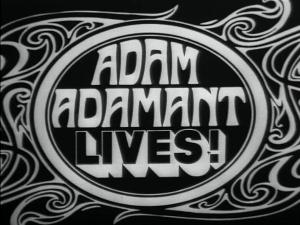
Adam Adamant Lives! is a British adventure television series that ran from 1966 to 1967 on BBC 1, starring Gerald Harper in the title role. The series was created and produced by several alumni from Doctor Who. The titular character was an adventurer born in 1867, who had been revived from hibernation in 1966, thus offering a satirical look at life in the 1960s through the eyes of an Edwardian. In 2020, Big Finish Productions reimagined the series as an audio drama.
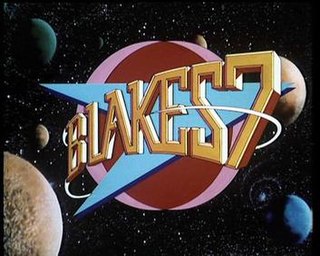
Blake's 7 is a British science fiction television programme produced by the BBC. Four 13-episode series were broadcast on BBC1 between 1978 and 1981. It was created by Terry Nation, who also wrote the first series, produced by David Maloney and Vere Lorrimer, and the script editor throughout its run was Chris Boucher, who wrote nine of its episodes. The main character for the first two series was Roj Blake, played by Gareth Thomas.
City of Death is the second serial of the seventeenth season of the British science fiction television series Doctor Who, which depicts the adventures of a time-travelling humanoid alien known as the Doctor. It was produced by the BBC and first broadcast in four weekly parts between 29 September 1979 and 20 October 1979 on BBC1. The serial was written by "David Agnew" – a pseudonym for the combined work of David Fisher, Douglas Adams, and Graham Williams – and directed by Michael Hayes.

The Navy Lark is a radio sitcom about life aboard a British Royal Navy frigate named HMS Troutbridge based in HMNB Portsmouth. In series 1 and 2, the ship and crew were stationed offshore at an unnamed location known simply as "The Island". In series 2 this island was revealed to be owned by Lt. Cdr. Stanton.

Thomas Nigel Kneale was a Manx screenwriter who wrote professionally for more than 50 years, was a winner of the Somerset Maugham Award, and was twice nominated for the BAFTA Award for Best British Screenplay.
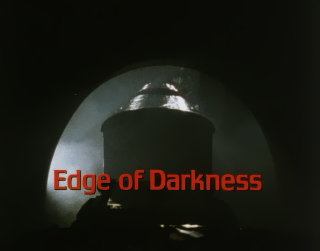
Edge of Darkness is a British television drama serial produced by BBC Television in association with Lionheart Television International and originally broadcast in six 50 to 55-minute episodes in late 1985. A mixture of crime drama and political thriller, it revolves around the efforts of widowed policeman Ronald Craven to unravel the truth behind the murder of his daughter Emma. Craven's investigations soon lead him into a murky world of government and corporate cover-ups and nuclear espionage, pitting him against dark forces that threaten the future of life on Earth.
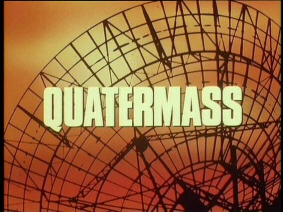
Quatermass is a 1979 British television science fiction serial. Produced by Euston Films for Thames Television, it was broadcast on the ITV network in October and November 1979. Like its three predecessors, Quatermass was written by Nigel Kneale. It is the fourth and final television serial to feature the character of Professor Bernard Quatermass who was played by John Mills.
Robot is the first serial of the 12th season in the British science fiction television series Doctor Who, which was first broadcast in four weekly parts on BBC1 from 28 December 1974 to 18 January 1975. It was the first full serial to feature Tom Baker as the Fourth Doctor, as well as Ian Marter as new companion Harry Sullivan. The serial brought a full end to the Pertwee era, as it was the final story with the production team of Barry Letts and script editor Terrance Dicks. It was also the final regular appearance of UNIT, who had become regulars starting with the first Jon Pertwee serial Spearhead From Space.

"The Year of the Sex Olympics" is a 1968 television play made by the BBC and first broadcast on BBC2 as part of Theatre 625. It stars Leonard Rossiter, Tony Vogel, Suzanne Neve and Brian Cox, and was directed by Michael Elliott. The writer was Nigel Kneale, best known as the creator of Quatermass.

Star Cops is a British science fiction television drama series first broadcast on BBC2 in 1987. It was devised by Chris Boucher, a writer who had previously worked on the science fiction television series Doctor Who and Blake's 7, as well as crime dramas such as Juliet Bravo and Bergerac.
Barry Leopold Letts was an English actor, television director, writer and producer, best known for being the producer of Doctor Who from 1969 to 1974.
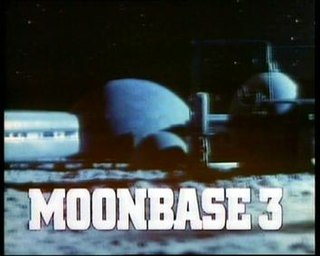
Moonbase 3 is a British science fiction television programme that ran for six episodes in 1973. It was a co-production between the BBC, 20th Century Fox and the American ABC network. Created by Doctor Who producer Barry Letts and script editor Terrance Dicks as a realistic alternative strand of TV science-fiction, it was not a commercial or critical success.

The Paradise of Death is a 5-part BBC radio drama, based on the long-running British science fiction television series Doctor Who, and starring Jon Pertwee as the Doctor.
Blake's 7 is a British science fiction television programme that was produced by the British Broadcasting Corporation (BBC) for its station BBC1. Set in the far future, Blake's 7 follows the fortunes of a group of rebels in their fight against the dictatorial Terran Federation. Four thirteen-episode series were produced between 1978 and 1981. Blake's 7 was created by Terry Nation, who later described it as "The Dirty Dozen in space". David Maloney was assigned to produce the series and Chris Boucher was appointed as the script editor. Gareth Thomas was cast as the eponymous Blake. The series' budget was severely restricted, which limited the scope for visual effects.

"From Venus with Love" is the first episode of the fifth series of the 1960s cult British spy-fi television series The Avengers, starring Patrick Macnee and Diana Rigg, and guest starring Barbara Shelley, Derek Newark, Jon Pertwee, Jeremy Lloyd and Philip Locke. It was first broadcast in the Southern region of the ITV network on Monday 9 January 1967. ABC Weekend Television, who commissioned the show for ITV, broadcast it in its own regions five days later on Saturday 14 January. The episode was directed by Robert Day, and written by Philip Levene.
Brian R. Degas was an English producer and writer, merchandiser, and creative packager of ancillary rights.

The Human Jungle is a British TV series about a psychiatrist, made for ABC Weekend TV by Independent Artists.












